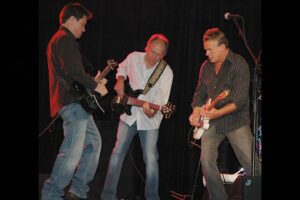
Feature Photo: Christian Bertrand / Shutterstock.com
Our Top 10 Uncle Tupelo Songs list presents the best Uncle Tupelo Songs like “No Depression,” “Effigy,” “Moonshiner” and many more. The best way to describe the music style of Uncle Tupelo from Belleville, Illinois would be to classify them as an alternative country. The founders of this band were Jay Farrar, Mike Heidorn, and Jeff Tweedy. After the recording and release of four studio albums, Farrar chose to leave the band that later saw Heidorn join up with him to form Son Volt. From 1987 until 1994, the alternative country music Uncle Tupelo was known for adding hardcore punk influence to an otherwise traditional country music genre. Much of the content stemming from the four studio recordings by Uncle Tupelo focused on the lifestyles of the working class from their neck of the woods as Illinois-born and raised citizens.
Before Uncle Tupelo
Before becoming Uncle Tupelo, Farrar, Heirdorn, and Tweedy were members of a band called The Primitives. However, there was also a British-based band of the same name so the name switched as a means to avoid confusion. Not only did this group change its name as a band but also the style of music they were playing. At first, they were performing cover songs performed by bands from the 1960s known for their garage punk rock style. Prior to this, they were also known for rockabilly-style country music before lineup changes were made to first become The Primitives, and then as of 1987, Uncle Tupelo. Wade Farrar was originally the lead singer before opting to complete his education won over the desire to continue as a performer.
As Uncle Tupelo
Now as Uncle Tupelo, the decision was made to write and record original material. Much of that garage punk style they performed as The Primitives was carried into the genre of country music from a group that wanted to incorporate their own style. Tweedy was especially fond of punk rock, which contrasted with the preference for rockabilly from Jay Farrar and his brothers. At this point, Wade Farrar had already returned to university while the third of the Farrar brothers, Dade, replaced himself with Mike Heidorn in 1984 as he did not share the same creative vision Uncle Tupelo was about to embark on. The inspiration behind this name came from a cartoon drawing.
When Uncle Tupelo’s demo tapes were given positive reviews, this earned the group an opportunity to sign up with their first record label. Via Rockville Records, the first of the band’s albums was No Depression, which was released in 1990. While on tour, these three members of Uncle Tupelo also formed a country cover band named Coffee Creek, along with Brian Henneman. He later became a member of Uncle Tupelo as well. As a group, Uncle Tupelo was given rave reviews as a new act but this was soured when the band’s professional relationship with Rockville Records soured. The record label opted not to pay the band royalties based on the number of sales the debut album had nor did they pay up when the second studio album, Still Feel Gone was recorded, released, and sold.
As alternative music sounds began to rise in popularity during the early 1990s, it was expected Uncle Tupelo would join in on a trend that was winning over the mainstream audience. However, the group wanted nothing to do with rock music, preferring to cater to the genres of country and folk instead. March 16-20, 1992 was the group’s third studio album, which featured Peter Buck from R.E.M. as the album’s producer. This act of defiance by Uncle Tupelo against the rock music industry wound up winning over the attention of major recording labels. Of all the recordings ever brought forth by Uncle Tupelo, it was this 1992 album that was by far the most successful. Unfortunately, Rockville Records was not happy with the fact Uncle Tupelo chose not to follow the trends that were being laid out by alternative rock bands.
At this point, what Rockville had to say no longer mattered as Uncle Tupelo would be rescued, so to speak, by Sire Records. Despite what should have been a great turn of events met with Mike Heidorn wanting to spend more time with a steady job he had secured for himself in Belleville, Illinois, along with a girlfriend who would later become his wife. He was first replaced by Bill Belzer, then by Ken Coomer, as the band’s new drummer. There were additional members to the roster that have come and gone before 1993’s Anodyne was recorded and released via Sire Records. For the first time in the band’s history, Uncle Tupelo was now finally realizing substantial enough commercial success that promised to see this group become a solid name on some US Billboard music charts.
No More Uncle Tupelo
Unfortunately, the relations between Jay Farrar and Jeff Tweedy became too sour for these two men to continue working together as bandmates. With new members in the lineup, sides were taken that ultimately saw Uncle Tupelo split into two different groups. Going into 1994, Farrar informed Uncle Tupelo’s manager he was going to leave the band to pursue his own direction in the music industry.
Despite the relations between Farrar and Tweedy being as tense as they were at the time, it was agreed to perform one last tour before these two recording artists officially went their separate ways. Tweedy, along with the roster of Uncle Tupelo without Farrar, became Wilco. Farrar founded his new band, Son Volt. Both of these bands achieved commercial success but neither Farrar nor Tweedy forgot the injustice that was done to them by Rockville Records. In the year 2000, they sued the label, managing to secure the rights to the work they did with all three albums that were released, along with whatever institutions that were owed to them.
Uncle Tupelo Legacy
Uncle Tupelo has been credited as one of the founders behind the mix of country and rock to form the genre known as alternative country. In addition to the four studio albums recorded and released by the band, there are also two compilation albums and three demo tapes. There are also four singles that were released by the band but none of them ever made an appearance on any official music charts as it seemed Uncle Tupelo was ahead of their time as star quality recording artists.
Top 10 Uncle Tupelo Songs
#10 – I Got Drunk
“I Got Drunk” was the first single released by Uncle Tupelo. It came from the group’s debut album, No Depression. Since its 1990 release, the title of this album has become a byword in the country music industry. This is due to the musical influence it brought forth, breaking the mold of a style that had been either traditional or neotraditional up to this point. Fast and furious, “I Got Drunk” served as Tupelo’s official notice to the music industry that conforming to standard styles was not their thing. They did not conform to traditional country music, nor did they conform to the alternative rock scene as it became a thing during the early part of the 1990s. The music style of Uncle Tupelo was their own, exactly as they wanted it to be.
#9 – John Hardy
As a traditional American folk song, “John Hardy” revolved around life on the railroad during the timeline of Spring 1893. In this lyrical tale, Hardy had himself baptized before he was hung before an audience who tried him for killing another man when the two were in conflict with each other. The song’s popularity saw it performed and recorded many times over, starting in 1924 with Eva Davis, before Uncle Tupelo would do their version in 1990 for their debut album, No Depression.
#8 – New Madrid
The banjo beauty, “New Madrid,” was the final song Uncle Tupelo recorded together before the band members went their separate ways. Although this song revolved around the tale of a predicted earthquake to hit the Midwest during the winter of 1990, the vocal delivery by Jeff Tweedy made this song seem so mellow. It’s hard to comprehend when hearing this amazing song there were actually tensions so great among the band members that they were about to split up to embark on different music paths. From the album, Andolyne, “New Madrid” also served as a somber reality that even what seems like the most tranquil of times still sits on shaky ground that can change everything in a moment’s notice.
#7 – Warfare
“Warfare” was one of the songs featured on Uncle Tupelo’s third studio album, March 16-20, 1992. The title behind the album marked how long it took for the group to record what became the most successful recording in the band’s history. “Warfare” is technically a gospel song but was performed as a musical masterpiece by Uncle Tupelo that can get more than just Christians to feel the beat and get into the spirit of this alternative country meets rock work of art.
#6 – Satan, Your Kingdom Must Come Down
The hymn, “Satan, Your Kingdom Must Come Down,” earned itself a whole new vibe, thanks to Uncle Tupelo. As a traditional song, it was used for the TV series, Greenleaf as part of its theme. In the TV series known as Boss, Robert Plant’s 2010 version was used for its theme. As for the 1993 version from Uncle Tupelo, this became one of the favorites in the alternative country genre from their album, March 16-20, 1992.
Tupelo’s lyrical confrontation against the devil was beautifully played out by the vocals, as well as the acoustic guitar. Bible believer or not, “Satan, Your Kingdom Must Come Down” remains a crowd-pleasing favorite, especially Uncle Tupelo’s version, as it has often been performed among congregations who see this as a source of inspiration in a world they agree is due to come to its end due to how badly it has been managed by him and his minions.
#5 – I Wanna Destroy You
“I Wanna Destroy You” was originally a song performed by the British rock group, The Soft Boys as one of the tracks from their 1980 album, Underwater Moonlight. Originally performed as a psychedelic number, the version performed by Uncle Tupelo saw it take on a country flair, mixed with just enough punk to make this a standout favorite, at least among the fans of this incredibly talented group. If you genuinely want a good taste of the country meets punk style, “I Wanna Destroy You” by Uncle Tupelo is definitely it. Their cover version of this song deservedly earned its place as a fan favorite, thanks to so much energy that came from Farrar, Heidorn, and Tweedy.
#4 – Gun
“Gun” was the lead track from the 1991 album, Still Feel Gone. It was released as the first of two singles from the album but failed to reach any US Billboard charts. However, Uncle Tupelo was signed with an independent recording label that didn’t have the kind of reach a major label would, which usually makes all the difference in the highly competitive music industry. Despite this, the talent of this band’s roster, as well as the quality of “Gun” as a song, was definitely turning enough heads that would put them on the map as one of the key influencers that developed alternative country music as a genre that would win over a growing audience. “Gun” served as a Tweedy-style proclamation he was a vocal powerhouse more than capable of catapulting Uncle Tupelo into a country meets punk band that took a decent shot at this college-style love song.
#3 – Moonshiner
“Moonshiner” was originally a folk song that still remains a source of controversy about its origin between America and Ireland, the popularity of it seems to matter more among the fans. Bob Dylan’s recording of this classic favorite came about in 1963 and is featured on his album, The Bootleg Series Volumes 1-3 (Rare & Released) 1961-1991. As for Uncle Tupelo’s 1992 version that’s featured in their March 16-20, 1992 album, this lyrical take on the parallels shared between moonshine and the world featured Uncle Tupelo at their best as a group.
#2 – Effigy
Creedence Clearwater Revival’s “Effigy” came from their 1969 album, Willy and the Poor Boys. In 1993, Uncle Tupelo recorded their version of this rock classic with their own unique style for the compilation album, No Alternative. That album was recorded by a number of artists as they collaborated together to raise funds for the AIDS Network. Among the music critics, “Effigy” was one of the best songs featured on the album, which also served as a head-turner for major record labels that saw potential in this group.
#1 – No Depression
Originally, “No Depression” was “No Depression in Heaven,” which was a song recorded by the first Carter Family in 1936. Since its first recording, it has been covered by a number of artists, including Uncle Tupelo. For them, not only was this the title song to the group’s debut album in 1990 but as its title as well. “No Depression” has since become the song standard with alternative country music and has since become a byword used as part of a movement.
There is also a magazine called No Depression that owes its creation to what Uncle Tupelo did for this song, as well as the genre of country music as a whole. “No Depression” has been credited as a 1990s Kickstarter to the alternative music scene and not just in country. Many alternative rock groups credit No Depression, “No Depression,” and Uncle Tupelo as one of the biggest sources of inspiration behind what each of them tries to do as they follow in their footsteps in what has always been an evolving music industry. Written during the time of the Great Depression, “No Depression” also carried forth a gospel message as it pointed out Heaven is where there’s no such thing as depression that drags people down.
Top 10 Uncle Tupelo Songs article published on Classic RockHistory.com© 2022
Classicrockhistory.com claims ownership of all its original content and Intellectual property under United States Copyright laws and those of all other foreign countries. No one person, business, or organization is allowed to re-publish any of our original content anywhere on the web or in print without our permission. All photos used are either public domain creative commons photos or licensed officially from Shutterstock under license with ClassicRockHistory.com. All photo credits have been placed at end of the article.



































